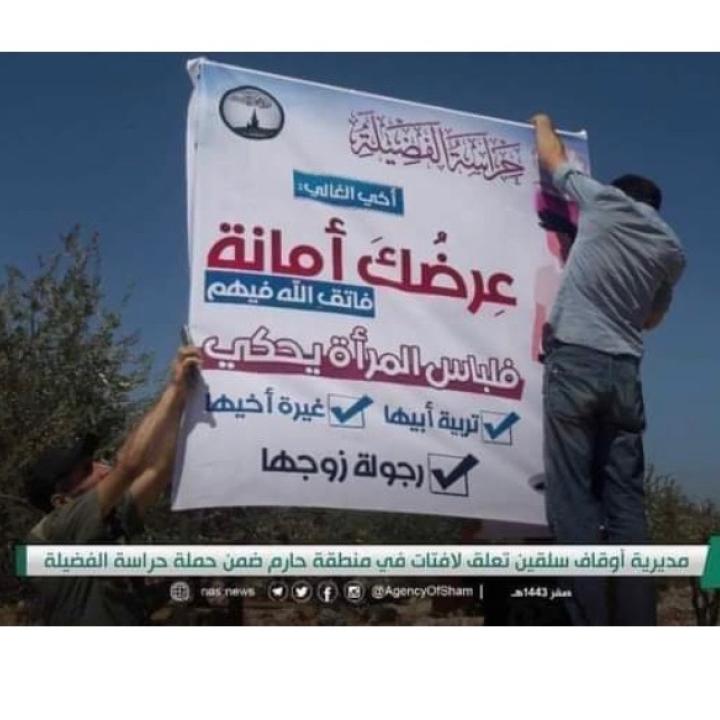
by Ishtar Al Shami
Oct 20, 2021
Ishtar Al Shami is a Syrian writer and activist.
Brief Analysis
Despite Syrian women’s significant contributions in coordinating anti-Assad activity during the 2011 revolution, Syrian women now face exacerbated obstacles against participating in civil society.
While women’s roles in Syrian civil society have expanded in the wake of the 2011 revolution, a heated debate about the role and rights of women is taking up a large portion of Syrian revolutionary media, be it press, television programs, or social media—including Clubhouse rooms dedicated to the issue. Today, one can read, watch, and listen extensively to dialogues about the female and feminist presence in community work inside Syria.
Syrian women stress the recency of their presence and credit it to the beginning of peaceful, organized revolutionary action against the Assad regime in 2011. During the revolution, women took on much more active roles than those previously available to them under a regime that claimed to be a secular state that ensures social justice—but failed to reflect this in personal status laws, which can significantly limit the rights of women. Moreover, the regime exercised a continuous violation of public liberties and designed a system dedicated to eliminating the role of civil society, monopolizing public space, and cementing the ideology of a single party leading all aspects of society and state. Additionally, the regime categorized any political, civil, or cultural movement outside its control as a treacherous activity hostile to the state, and accused it of collaboration with global imperialism.
In contrast, women participated in popular protests from the beginning of the revolution, and played a major role in establishing Local Coordination Committees, community networks that organized demonstrations throughout the country. This enabled women to effectively participate in the peace, media, and relief movements throughout Syria, especially in besieged and conflict-stricken areas. Women have also been active in various political activities, and continue to work to prove the importance of their involvement in opposition institutions.
However, these efforts have not quelled the stigma against women in civil leadership roles. Female activists still encounter great resistance to their participation in decision-making, despite international institutions’ insistence on women’s representation. Moreover, feminists do not want to become mere numbers in the quotas often required by the international community. They continue to strive for substantive participation in political work due to increased social awareness regarding women’s contributions , not as a symbolic response to an external dictate.
Internal Pushback Against the Syrian Feminist Movement
However, these women face significant internal pressures against their involvement. Islamists consider the International Convention on the Elimination of All Forms of Discrimination Against Women (CEDAW) and other international rights conventions to be contrary to Islamic law, classifying them as a major danger to society and rejecting their applicability in Syria. Therefore, Syrian women find themselves on fragile ground given the marked absence of appropriate legal frameworks to protect them from violence and marginalization.
Images of a post by National Coalition Member Mohammad Ayman Aljamal, and the Syrian Feminist Lobby’s response to it:
Open image
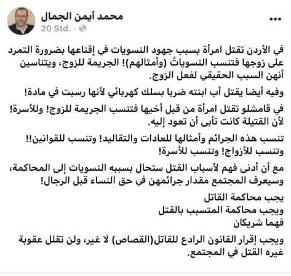
Open image
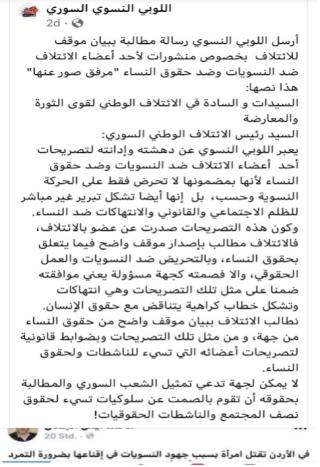
Even those women working with international organizations or leading internationally funded projects in opposition areas have faced a marked increase in inflammatory rhetoric against their work. Specifically, they face allegations that they are merely tools of the West carrying out schemes hostile to Sharia and social norms. These accusations put Syrian female activists and employees of international institutions, along with their colleagues, at risk of ideologically-motivated violence.
Images from publications by Saeed Nahhas about the CEDAW convention and anti-feminism being equivalent to antisemitism:
Open image

Open image
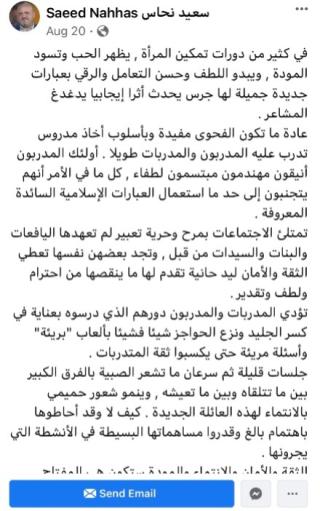
Open image
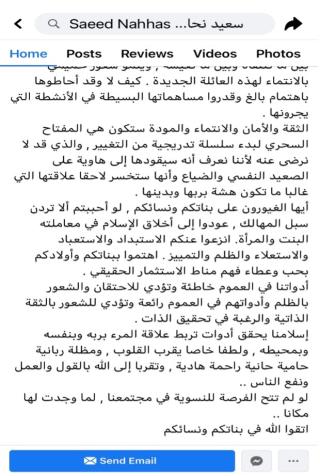
The situation escalated after a Friday sermon delivered by the President of the Syrian Islamic Council, Sheikh Osama al-Rifai, on August 6 in the area of Azaz, near Aleppo. In the sermon, he addressed the local community, warning against women’s work in international organizations in the area, and describing them as having broken with religion and traditions. He stated that women are recruited by the West and the United Nations with the goal of destroying the stability of the family and social system in Syria by propagating alien thought forbidden under the rules of Islamic law.
Al-Rifai’s statement has prompted impassioned responses, including by women who wear hijab and are outwardly committed to Islam. Many took to social media to express their rejection of his implicitly inflammatory and unfair rhetoric against women.
Images of activist Bayan Rehan’s August 11 Facebook post in response to Sheikh Osama al-Rifai’s sermon:
No comments:
Post a Comment